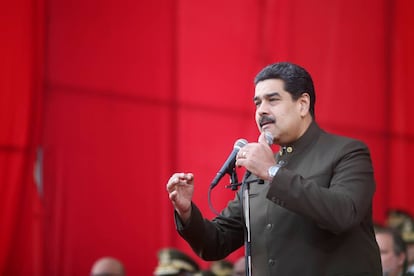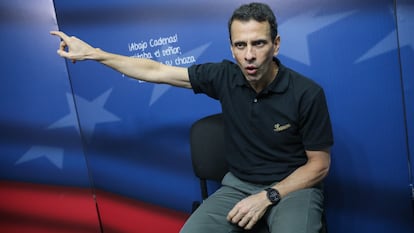The European Union and United States move closer on Venezuela policy
EU foreign policy chief Josep Borrell has attracted Washington to a gradual strategy that offers the Nicolás Maduro regime a progressive lifting of sanctions in return for transparent elections

When EU foreign policy chief Josep Borrell met US Secretary of State Antony Blinken for the first time in Brussels, he handed Blinken the first draft of a joint initiative on Venezuela. The draft was sent back and forth across the Atlantic to hash out the final version published on June 25, with the announcement that the EU, US and Canada would ease sanctions as long as transparent elections are held. In the joint statement, the signatories ask Caracas for a reform plan in which Maduro commits to holding democratic elections, with a progressive lifting of sanctions in return. It is the core piece of the new EU-North American strategy on Venezuela.
That assertion represents a significant shift from the Trump administration’s uncompromising stance on Venezuela. According to European sources, Borrell swayed Blinken with a proposal focused on long-term diplomacy to find a way out of Venezuela’s political, economic and humanitarian crisis. He also offered a working paper with profiles of the principal figures in the Maduro regime and the Venezuelan opposition, along with an analysis of what the EU sees as American mistakes in dealing with the former. Blinken was undeterred by Borrell’s frankness. Meanwhile preparations for a new round of negotiations between Maduro and Juan Guaidó (representing the country’s opposition parties) are beginning to gather speed under Norwegian mediation. A delegation from the European Union will also visit Caracas to evaluate whether it is feasible for an international mission to go to Venezuela for the next regional elections in November.
The regime is also offering new concessions as it seeks to improve its international image. It has officially curbed the powers of “protectors,” figures appointed by the government to manage elected opposition state governors. At the same time, the new parliament controlled by the ruling party is designing a new “Law of Communal Cities,” which would increase its control over individual states, eroding the governors’ power.A group of opposition leaders headed by Gerardo Blyde, Leopoldo López and Julio Borges recently visited Washington and Brussels with the aim of strengthening their common hand at the negotiating table. The opposition will propose a schedule for general elections as a starting point to re-legitimize state institutions. President Maduro calls for any agreement with the opposition to start by recognizing the authorities developed by his own regime, and may seek to anchor a deal around a presidential election scheduled for 2023.
Agreement without consensus

The common ground struck by Brussels and Washington on Venezuela has some important nuances. The division within the Biden administration on Venezuela policy in particular, and Latin America in general, is becoming more obvious by the day. Less than four months after taking office, the White House stated in no uncertain terms that a change in policy on Venezuela (and Cuba) was not high on Biden’s international agenda. Juan Sebastián González, Western Hemisphere advisor on the National Security Council, delivered this message as the man with the president’s ear on Latin American affairs. Amid an open trade war with China and busy salvaging the wreckage of the nuclear agreement with Iran, Washington wants to play it safe.
The White House does seem determined not to lift sanctions against Maduro if there is no genuine democratic commitment on his part. At the same time, the State Department is opting for consensus and negotiation, according to European diplomatic sources in Washington. The willingness to support Borrell’s ideas does not prevent Blinken from calling Maduro “a brutal dictator” and insisting that the US will continue to recognize Guaidó as the true leader of Venezuela. James Story, the US ambassador to Venezuela who is currently stationed in Bogotá, said that “sanctions are only a tool to force a transition to democracy,” in an interview with EL PAÍS. “I think the agreement is feasible. Politics isn’t static, we are always reviewing tactics. We will keep up the pressure of sanctions, and above all keep the same objectives.”
A certain section of the Venezuelan opposition negotiating team is wary of Borrell’s approach and style. This faction considers him to be basically uncommitted to the genuine restoration of democracy in the country, and more interested in getting rid of an enormously complex problem by forging a partial consensus around regional elections. They fear the offer will only vaguely commit Maduro to organize elections that may take place in 2023 regardless.
For historical and cultural reasons, Spain is Europe’s natural sounding board with Latin America, and Venezuelan politicians believe they can count on a basic understanding from almost all of its nations, particularly in Eastern Europe. Others believe that Borrell’s filter tames the reality of excesses committed by Maduro, as EU policy must be practical and gradual in its approach. The European Parliament’s statements on Venezuela tend to be a lot more forceful than Borrell’s personal declarations. “Europe doesn’t have a proper sense of the implications and seriousness of Maduro’s dictatorship, and if they know, then they don’t really care,” said a senior Venezuelan official close to the negotiation process, who asked to be quoted anonymously. “The United States does know and does care. That is the difference.”
The step-by-step approach characterized by Borrell does have a supporter in Henrique Capriles Radonski, a key figure in the Venezuelan opposition who questioned Guaidó and his strategy in the Trump era, and who heads an emerging faction of independent activists determined to explore different paths, particularly diverging from Leopoldo López. Capriles was part of the agreement that allowed the appointment of the new members of the National Electoral Council managed by Maduro, and now prefers to remain on the sidelines of the current opposition negotiating team.
Maduro’s offers to improve Venezuela’s electoral framework are encouraging the grassroots activists of parties that support Guaidó, and recently the number of leaders insisting on participating in the November regional elections has increased. This revisionist mood includes Voluntad Popular (Popular Will), the party founded by López to which Guaidó belongs, and which has been the biggest thorn in Maduro’s side. “Our greatest fear is that a European Union mission will come and say what Maduro wants to be said,” says another opposition leader close to Guaidó's team. “I suspect that for them a moderately transparent regional election is enough, and they leave the problem [of Venezuela] back in Maduro’s hands so they can be rid of it.”
Tu suscripción se está usando en otro dispositivo
¿Quieres añadir otro usuario a tu suscripción?
Si continúas leyendo en este dispositivo, no se podrá leer en el otro.
FlechaTu suscripción se está usando en otro dispositivo y solo puedes acceder a EL PAÍS desde un dispositivo a la vez.
Si quieres compartir tu cuenta, cambia tu suscripción a la modalidad Premium, así podrás añadir otro usuario. Cada uno accederá con su propia cuenta de email, lo que os permitirá personalizar vuestra experiencia en EL PAÍS.
¿Tienes una suscripción de empresa? Accede aquí para contratar más cuentas.
En el caso de no saber quién está usando tu cuenta, te recomendamos cambiar tu contraseña aquí.
Si decides continuar compartiendo tu cuenta, este mensaje se mostrará en tu dispositivo y en el de la otra persona que está usando tu cuenta de forma indefinida, afectando a tu experiencia de lectura. Puedes consultar aquí los términos y condiciones de la suscripción digital.








































